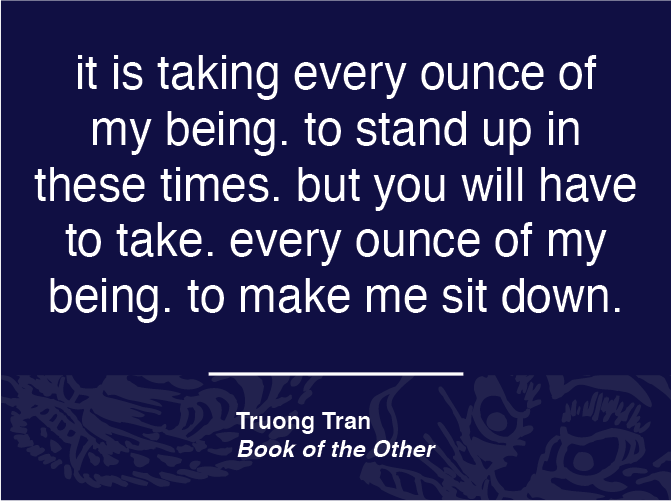A few years ago at AAAS in San Francisco in 2018, some of us got together and put together a roundtable titled: Writers Don’t Go to AAAS: Bridging the Gap Between the Asian American Literary Community and Asian American Literary Scholarship.
Three years later, we are still attempting to build this bridge. | In fact, it seems especially relevant right now.
Kaya Press is entering our 27th year of existence as the only Asian Diasporic independent publishing house run by Asian American women.
“Yet, all my life, America has told me that I’m overreacting. That it is still O.K. to laugh at Asian names, still O.K. to make fun of Asian people—those weird foreigners who all look the same and have those hilarious, ugly accents. I know that it’s still O.K. because it keeps happening, in media and in real life. And, when it does, and Asian people express anger about it, they are countered with “you’re too sensitive; it’s just a joke.” I get it—the joke is more important than our existence.” – Beth Nguyen in The New Yorker.
After George Floyd was murdered by a police officer named Derek Chauvin on camera in May 2020, and the country erupted into protest and conversation, we spent a lot of time at Kaya–in our separate homes, quarantined from each other–talking on Zoom calls and over long email threads about what it means for us to make a statement about our connections to the movement for Black Lives. In one email, publisher Sunyoung Lee said: “The whole point of Kaya’s work (for me at least) is and always has been an attempt to address what I see the heart of the problem — which, if you trace it back far enough, back past hyperactive consumerism and White Supremacy and capitalism and the Enlightenment’s glorification of the separation of mind and body — is I think ultimately a failure of the imagination. And what better way of fixing a failure of the imagination than by expanding and enriching and nourishing the imagination? By whatever means possible. It’s because of things we encounter — that are so startling or so perceptive or so beautiful or so affecting that they stay lodged in our minds and alter its structure. Done right, it shows us that the truths that we “held to be self-evident” might very well be a prison from which we would do well to escape.”
“Do you ever get sick of trying to be a miscast space filler in someone else’s self-absorbed narrative, that has nothing to do with you. That whether you are in their room or not, it makes no difference to their outcome, though you add color and spice. Do you ever get so fed up, you just want to flip a table, or throw a chair, say this some bullshit, storm out of the room, and slam the door behind you. // A couple of things about that room. They don’t want you in it. It’s true. But it’s also true that it’s a pretty whack ass room. Its outdated décor is garish and overstuffed. The air in their room is dense with mold. And it is filled with people who keep running into you because they don’t see you there, or want to suit themselves in your skin, then disrobe and stash you when you become inconvenient, such as when more important people enter the room. This room is also filled with brown people who are okay with being flayed and trashed. When they are not pleading with you to just shut your mouth, they are trying to push you out the window. Why do you want so badly to be in this room with them.” From Barbara Jane Reyes “Dear Brown Girl“
After a man in Atlanta murdered six Asian women on March 16th, Author Lisa Ko tweeted: “As a writer and reader of books, I am sorry to say that white supremacy is not going to be dismantled through diverse reading lists.”
But what if it can?
Some things people have said to us lately: “Are you going to make a statement?” and “You should milk this moment.”
Some things that are hard to talk about: Being viewed as niche and unimportant in mainstream publishing spaces and by many authors, even Asian American authors, because of our Asian diasporic focus. The feeling at mainstream literary conferences when Asian-presenting people intentionally avoid our booth. The fact that we feel unsettled at the Association of Asian American Studies (AAAS) conference as well despite our many years of attendance, award-awarding titles, and decades of work.
Why is it so easy to support “uplifting BIPOC voices” yet so difficult to support BIPOC editors and publishers? What are the ways in which BIPOC editors and publishers can help further the work of dismantling white supremacy in ways that even diverse reading lists can’t?
We have been doing this work and are continuing to do this work. We look forward to doing more of it with whomever is interested. Email us, or respond on our social media: @kayapress.
should you begin or end. with questions to you. are you angry. are you breaking. so what are you going to do about this. what are you going to say tomorrow. and the next day. and the next. and the next. are you hurt. what will you say when class begins. what are you having for dinner tonight. where will you go. how will you live. why are you here. what do you love. when will you leave. will you go back. to where you are from. did you really just say. is this just one. of many moments. did you really just ask. is there something you left out. how will you begin. Somewhere in this book. is this a lifetime. you said you wished.that this. had never happened. do you still wish this. and would you change this. if you could. who are you now. can you get up. what will you write. if not this.
— Truong Tran, Book of the Other


Leave a Comment
We'd love to know what you think.